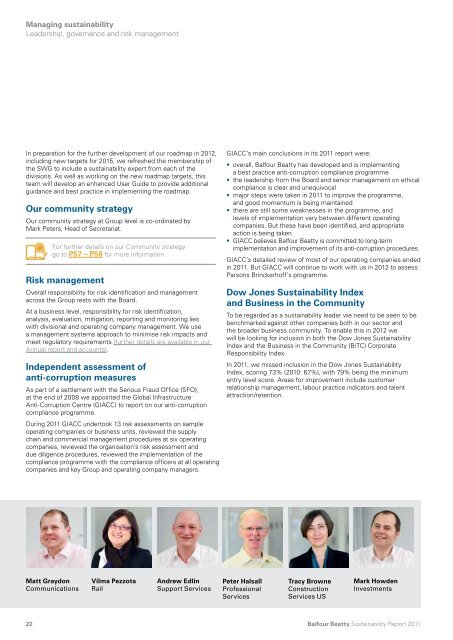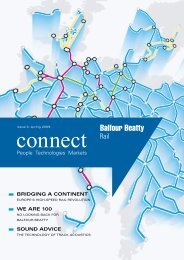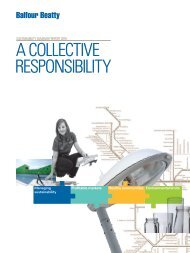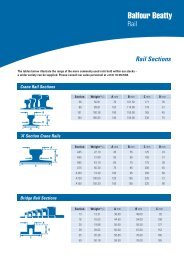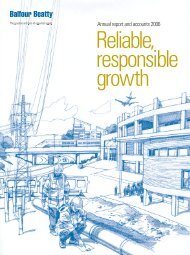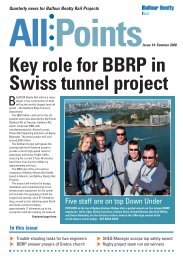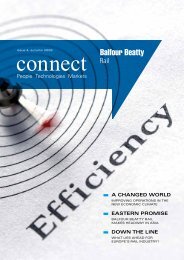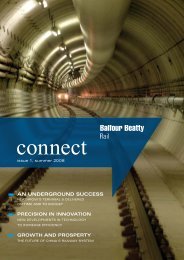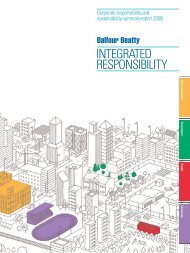Sustainability Report 2011 - Balfour Beatty Rail
Sustainability Report 2011 - Balfour Beatty Rail
Sustainability Report 2011 - Balfour Beatty Rail
You also want an ePaper? Increase the reach of your titles
YUMPU automatically turns print PDFs into web optimized ePapers that Google loves.
Managing sustainability<br />
Leadership, governance and risk management<br />
In preparation for the further development of our roadmap in 2012,<br />
including new targets for 2015, we refreshed the membership of<br />
the SWG to include a sustainability expert from each of the<br />
divisions. As well as working on the new roadmap targets, this<br />
team will develop an enhanced User Guide to provide additional<br />
guidance and best practice in implementing the roadmap.<br />
Our community strategy<br />
Our community strategy at Group level is co-ordinated by<br />
Mark Peters, Head of Secretariat.<br />
For further details on our Community strategy<br />
go to P57 – P58 for more information<br />
Risk management<br />
Overall responsibility for risk identification and management<br />
across the Group rests with the Board.<br />
At a business level, responsibility for risk identification,<br />
analysis, evaluation, mitigation, reporting and monitoring lies<br />
with divisional and operating company management. We use<br />
a management systems approach to minimise risk impacts and<br />
meet regulatory requirements (further details are available in our<br />
Annual report and accounts).<br />
Independent assessment of<br />
anti-corruption measures<br />
As part of a settlement with the Serious Fraud Office (SFO),<br />
at the end of 2008 we appointed the Global Infrastructure<br />
Anti-Corruption Centre (GIACC) to report on our anti-corruption<br />
compliance programme.<br />
During <strong>2011</strong> GIACC undertook 13 risk assessments on sample<br />
operating companies or business units, reviewed the supply<br />
chain and commercial management procedures at six operating<br />
companies, reviewed the organisation’s risk assessment and<br />
due diligence procedures, reviewed the implementation of the<br />
compliance programme with the compliance officers at all operating<br />
companies and key Group and operating company managers.<br />
Matt Graydon<br />
Communications<br />
22<br />
Vilma Pezzota<br />
<strong>Rail</strong><br />
Andrew Edlin<br />
Support Services<br />
GIACC’s main conclusions in its <strong>2011</strong> report were:<br />
• overall, <strong>Balfour</strong> <strong>Beatty</strong> has developed and is implementing<br />
a best practice anti-corruption compliance programme<br />
• the leadership from the Board and senior management on ethical<br />
compliance is clear and unequivocal<br />
• major steps were taken in <strong>2011</strong> to improve the programme,<br />
and good momentum is being maintained<br />
• there are still some weaknesses in the programme, and<br />
levels of implementation vary between different operating<br />
companies. But these have been identified, and appropriate<br />
action is being taken<br />
• GIACC believes <strong>Balfour</strong> <strong>Beatty</strong> is committed to long-term<br />
implementation and improvement of its anti-corruption procedures.<br />
GIACC’s detailed review of most of our operating companies ended<br />
in <strong>2011</strong>. But GIACC will continue to work with us in 2012 to assess<br />
Parsons Brinckerhoff’s programme.<br />
Dow Jones <strong>Sustainability</strong> Index<br />
and Business in the Community<br />
To be regarded as a sustainability leader we need to be seen to be<br />
benchmarked against other companies both in our sector and<br />
the broader business community. To enable this in 2012 we<br />
will be looking for inclusion in both the Dow Jones <strong>Sustainability</strong><br />
Index and the Business in the Community (BiTC) Corporate<br />
Responsibility Index.<br />
In <strong>2011</strong>, we missed inclusion in the Dow Jones <strong>Sustainability</strong><br />
Index, scoring 73% (2010: 67%), with 79% being the minimum<br />
entry level score. Areas for improvement include customer<br />
relationship management, labour practice indicators and talent<br />
attraction/retention.<br />
Peter Halsall<br />
Professional<br />
Services<br />
Tracy Browne<br />
Construction<br />
Services US<br />
Mark Howden<br />
Investments<br />
<strong>Balfour</strong> <strong>Beatty</strong> <strong>Sustainability</strong> <strong>Report</strong> <strong>2011</strong>


